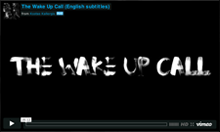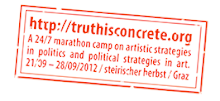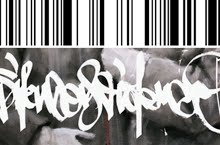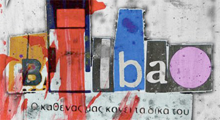New Year's Eve...
For many, if you've been out lately, the mayan eschatology has been painfully fulfilled...
Hope for the best, prepare for the worst.
Volos (Iolcus), Greece.
For the "It's all Greek to me" amongst you, the trash can text "KAI TOU XRONOY" is a typical Greek wish to repeat this year's good times, while being in the same time a word play between... "Next year what?" and "Are you gonna take it one more year"?
Extra thanks to "K" and the Leopard Crew
Sunday 30 December 2012
Monday 24 December 2012
The Wake Up Call - Versione Italiana
The Wake Up Call Documentary, Italian Version.
The Wake Up Call, Documentario, Versione Italina. And Valigia Blu Kallergis interview translated.
The political graffiti in Greece: a long course tradition or a result of the crisis?
It is a long-standing tradition. Athens is one of the capitals of Europe's most dynamic and active in terms of street art. Even the state authorities have supported - mainly due to their inadequacy to deal with the "problem." Artists are invited to paint large surfaces to cover public degradation. The political aspect, then, is historical, but the number of graffiti has increased exponentially since the crisis.
One thing struck me most graffiti is their grimness of the background (for example, gas masks, hoods, scene of riots, fire, etc..). These graffiti reflect the general feeling of the Greek society?
Not really, at least not in the sense that the majority is ready to buy a mask, make a Molotov cocktail and destroy everything. There is certainly anger but not thirst for violence - for now. The mood is more pessimistic and fatalistic. The graffiti reflects this mood in an almost post-apocalyptic, painting a scenario where people walk in a gray city and the only colors that surround it are those that come from the urban guerrilla.
In your documentary we see artists are not extremists or dangerous anarcho-insurrectionists. They are ordinary people, belonging to the middle class. Now, the question arises: the Greek middle class is becoming more radical?
Certainly, but not in a rational manner. There's definitely a bias: people become radical and head or to the far left or the far right. My opinion is that it is not a conscious decision made to save the country, but people are also faced with the absence of traditional politics (centrist).
Whats Greek police stance over street art? And the media?
I'm not particularly worried: there are so many problems - and far more important - that you do not put a chase street artist. Unless, of course, the latter does not go too far with the provocations (like trying to paint the Parliament, for example). However, the police and the media are among the five favorite subject of political graffiti, because of the role played by the media in crisis and historical trends oppressive police.
Paul Mason, a BBC journalist, recently wrote that "at this time, Greece is a country full of resignation," and how this resignation may be "strangely liberating." Do you agree with this view?
There is some truth. People are resigned in many ways, but most do not harbor any hope against the State. Two years hopeless enough to ensure that people will have enough rules and political moderation. Street art is a way through which artists are an area of freedom - without getting your hopes up, though.
At a more general level, I think the feeling of liberation comes from the fact that people no longer have anything to lose. The loss of material goods in a sense, free, making them live with less fear. People are less afraid to change, to speak, and - hopefully - to vote for something different from the usual.
The Wake Up Call, Documentario, Versione Italina. And Valigia Blu Kallergis interview translated.
The political graffiti in Greece: a long course tradition or a result of the crisis?
It is a long-standing tradition. Athens is one of the capitals of Europe's most dynamic and active in terms of street art. Even the state authorities have supported - mainly due to their inadequacy to deal with the "problem." Artists are invited to paint large surfaces to cover public degradation. The political aspect, then, is historical, but the number of graffiti has increased exponentially since the crisis.
One thing struck me most graffiti is their grimness of the background (for example, gas masks, hoods, scene of riots, fire, etc..). These graffiti reflect the general feeling of the Greek society?
Not really, at least not in the sense that the majority is ready to buy a mask, make a Molotov cocktail and destroy everything. There is certainly anger but not thirst for violence - for now. The mood is more pessimistic and fatalistic. The graffiti reflects this mood in an almost post-apocalyptic, painting a scenario where people walk in a gray city and the only colors that surround it are those that come from the urban guerrilla.
In your documentary we see artists are not extremists or dangerous anarcho-insurrectionists. They are ordinary people, belonging to the middle class. Now, the question arises: the Greek middle class is becoming more radical?
Certainly, but not in a rational manner. There's definitely a bias: people become radical and head or to the far left or the far right. My opinion is that it is not a conscious decision made to save the country, but people are also faced with the absence of traditional politics (centrist).
Whats Greek police stance over street art? And the media?
I'm not particularly worried: there are so many problems - and far more important - that you do not put a chase street artist. Unless, of course, the latter does not go too far with the provocations (like trying to paint the Parliament, for example). However, the police and the media are among the five favorite subject of political graffiti, because of the role played by the media in crisis and historical trends oppressive police.
Paul Mason, a BBC journalist, recently wrote that "at this time, Greece is a country full of resignation," and how this resignation may be "strangely liberating." Do you agree with this view?
There is some truth. People are resigned in many ways, but most do not harbor any hope against the State. Two years hopeless enough to ensure that people will have enough rules and political moderation. Street art is a way through which artists are an area of freedom - without getting your hopes up, though.
At a more general level, I think the feeling of liberation comes from the fact that people no longer have anything to lose. The loss of material goods in a sense, free, making them live with less fear. People are less afraid to change, to speak, and - hopefully - to vote for something different from the usual.
Wednesday 12 December 2012
The Wake Up Call - The documentary
The Wake Up Call, short greek politic graffiti documentary by Kostas Kallergis finally on air!
Featuring Bleeps, Mapet, Pavlo and yours truly "me".
enjoy.

Featuring Bleeps, Mapet, Pavlo and yours truly "me".
enjoy.

Thursday 6 December 2012
New TVXS Allegria relay
6 December 2012.
New relay from TVXS.gr of Samaras Alegria-Anergia on occasion of new climb of Greek unemployement to 26%.
New relay from TVXS.gr of Samaras Alegria-Anergia on occasion of new climb of Greek unemployement to 26%.
Subscribe to:
Posts (Atom)















